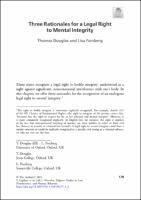Chapter 8 Three Rationales for a Legal Right to Mental Integrity
Author(s)
Douglas, Thomas
Forsberg, Lisa
Collection
European Research Council (ERC); EU collectionLanguage
EnglishAbstract
Many states recognize a legal right to bodily integrity, understood as a right against significant, nonconsensual interference with one’s body. Recently, some have called for the recognition of an analogous legal right to mental integrity: a right against significant, nonconsensual interference with one’s mind. In this chapter, we describe and distinguish three different rationales for recognizing such a right. The first appeals to case-based intuitions to establish a distinctive duty not to interfere with others’ minds; the second holds that, if we accept a legal right to bodily integrity, then we must, on pain of philosophical inconsistency, accept a case for an analogous right over the mind; and the third holds that recent technological developments create a need for a legal right to mental integrity.
Book
NeurolawKeywords
mental integrity; legal rightDOI
10.1007/978-3-030-69277-3_8ISBN
9783030692766, 9783030692773Publisher
Springer NaturePublisher website
https://www.springernature.com/gp/products/booksPublication date and place
2021Grantor
Classification
Life sciences: general issues


 Download
Download Web Shop
Web Shop